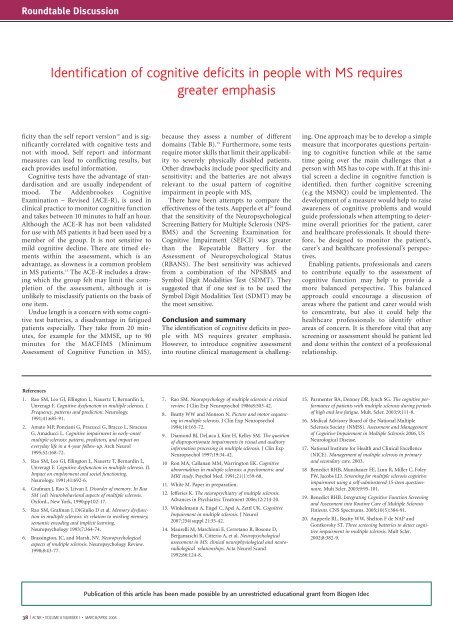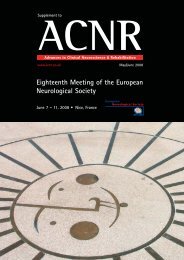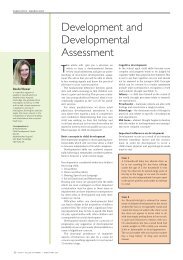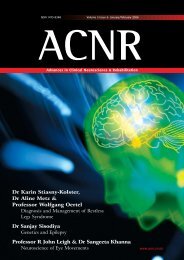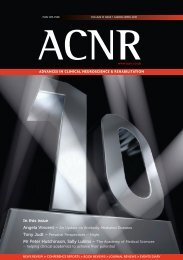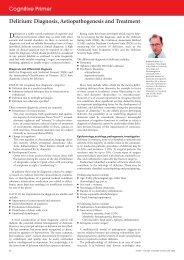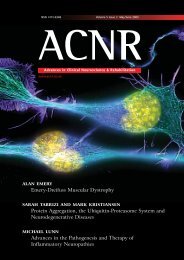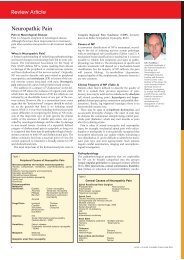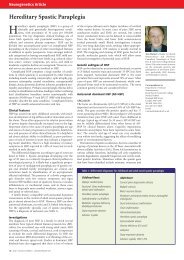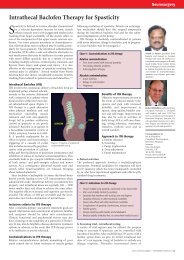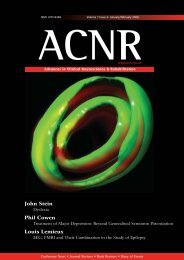Paul Reading Maurice Curtis, Andrew Naylor, Richard Faull ... - ACNR
Paul Reading Maurice Curtis, Andrew Naylor, Richard Faull ... - ACNR
Paul Reading Maurice Curtis, Andrew Naylor, Richard Faull ... - ACNR
Create successful ePaper yourself
Turn your PDF publications into a flip-book with our unique Google optimized e-Paper software.
Roundtable DiscussionIdentification of cognitive deficits in people with MS requiresgreater emphasisficity than the self report version 19 and is significantlycorrelated with cognitive tests andnot with mood. Self report and informantmeasures can lead to conflicting results, buteach provides useful information.Cognitive tests have the advantage of standardisationand are usually independent ofmood. The Addenbrookes CognitiveExamination – Revised (ACE-R), is used inclinical practice to monitor cognitive functionand takes between 10 minutes to half an hour.Although the ACE-R has not been validatedfor use with MS patients it had been used by amember of the group. It is not sensitive tomild cognitive decline. There are timed elementswithin the assessment, which is anadvantage, as slowness is a common problemin MS patients. 13 The ACE-R includes a drawingwhich the group felt may limit the completionof the assessment, although it isunlikely to misclassify patients on the basis ofone item.Undue length is a concern with some cognitivetest batteries, a disadvantage in fatiguedpatients especially. They take from 20 minutes,for example for the MMSE, up to 90minutes for the MACFIMS (MinimumAssessment of Cognitive Function in MS),because they assess a number of differentdomains (Table B). 19 Furthermore, some testsrequire motor skills that limit their applicabilityto severely physically disabled patients.Other drawbacks include poor specificity andsensitivity; and the batteries are not alwaysrelevant to the usual pattern of cognitiveimpairment in people with MS,There have been attempts to compare theeffectiveness of the tests. Aupperle et al 20 foundthat the sensitivity of the NeuropsychologicalScreening Battery for Multiple Sclerosis (NPS-BMS) and the Screening Examination forCognitive Impairment (SEFCI) was greaterthan the Repeatable Battery for theAssessment of Neuropsychological Status(RBANS). The best sensitivity was achievedfrom a combination of the NPSBMS andSymbol Digit Modalities Test (SDMT). Theysuggested that if one test is to be used theSymbol Digit Modalities Test (SDMT) may bethe most sensitive.Conclusion and summaryThe identification of cognitive deficits in peoplewith MS requires greater emphasis.However, to introduce cognitive assessmentinto routine clinical management is challenging.One approach may be to develop a simplemeasure that incorporates questions pertainingto cognitive function while at the sametime going over the main challenges that aperson with MS has to cope with. If at this initialscreen a decline in cognitive function isidentified, then further cognitive screening(e.g the MSNQ) could be implemented. Thedevelopment of a measure would help to raiseawareness of cognitive problems and wouldguide professionals when attempting to determineoverall priorities for the patient, carerand healthcare professionals. It should therefore,be designed to monitor the patient’s,carer’s and healthcare professional’s perspectives.Enabling patients, professionals and carersto contribute equally to the assessment ofcognitive function may help to provide amore balanced perspective. This balancedapproach could encourage a discussion ofareas where the patient and carer would wishto concentrate, but also it could help thehealthcare professionals to identify otherareas of concern. It is therefore vital that anyscreening or assessment should be patient ledand done within the context of a professionalrelationship.References1. Rao SM, Leo GJ, Ellington L, Nauertz T, Bernardin L,Unveragt F. Cognitive dysfunction in multiple sclerosis. I.Frequency, patterns and prediction. Neurology.1991;41:685-91.2. Amato MP, Ponziani G, Pracucci G, Bracco L, SiracusaG, Amaducci L. Cognitive impairment in early-onsetmultiple sclerosis: pattern, predictors, and impact oneveryday life in a 4-year follow-up. Arch Neurol1995;52:168-72.3. Rao SM, Leo GJ, Ellington L, Nauertz T, Bernardin L,Unveragt F. Cognitive dysfunction in multiple sclerosis. II.Impact on employment and social functioning.Neurology. 1991;41:692-6.4. Grafman J, Rao S, Litvan I. Disorder of memory. In RaoSM (ed) Neurobehavioral aspects of multiple sclerosis.Oxford., New York, 1990;pp102-17.5. Rao SM, Grafman J, DiGiulio D et al. Memory dysfunctionin multiple sclerosis: its relation to working memory,semantic encoding and implicit learning.Neuropsychology 1993;7:364-74.6. Brassington, JC, and Marsh, NV. Neuropsychologicalaspects of multiple sclerosis. Neuropsychology Review.1998;8:43-77.7. Rao SM. Neuropsychology of multiple sclerosis: a criticalreview. J Clin Exp Neuropsychol 1986;8:503-42.8. Beatty WW and Monson N. Picture and motor sequencingin multiple sclerosis. J Clin Exp Neuropsychol1994;16:165-72.9. Diamond BJ, DeLuca J, Kim H, Kelley SM. The questionof disproportionate impairments in visual and auditoryinformation processing in multiple sclerosis. J Clin ExpNeuropsychol 1997;19:34-42.10 Ron MA, Callanan MM, Warrington EK. Cognitiveabnormalities in multiple sclerosis: a psychometric andMRI study. Psychol Med. 1991;21(1):59-68.11. White M. Paper in preparation.12. Jefferies K. The neuropsychiatry of multiple sclerosis.Advances in Psychiatric Treatment 2006;12:214-20.13. Winkelmann A, Engel C, Apel A, Zettl UK. CognitiveImpairment in multiple sclerosis. J Neurol2007:254(suppl 2):35-42.14. Maurelli M, Marchioni E, Cerretano R, Bosone D,Bergamaschi R, Citterio A, et al. Neuropsychologicalassessment in MS: clinical neurophysiological and neuroradiologicalrelationships. Acta Neurol Scand1992;86:124-8.15. Parmenter BA, Denney DR, lynch SG. The cognitive performanceof patients with multiple sclerosis during periodsof high and low fatigue. Mult. Scler. 2003;9:111-8.16. Medical Advisory Board of the National MultipleSclerosis Society (NMSS). Assessment and Managementof Cognitive Impairment in Multiple Sclerosis 2006, USNeurological Disease.17. National Institute for Health and Clinical Excellence(NICE). Management of multiple sclerosis in primaryand secondary care. 2003.18 Benedict RHB, Munshauer FE, Linn R, Miller C, FoleyFW, Jacobs LD. Screening for multiple sclerosis cognitiveimpairment using a self-adminstered 15-item questionnaire.Mult Scler. 2003;9:95-101.19. Benedict RHB. Integrating Cognitive Function Screeningand Assessment into Routine Care of Multiple SclerosisPatients. CNS Spectrums. 2005;10(5):384-91.20. Aupperle RL, Beatty WW, Shelton F de NAP andGontkovsky ST. Three screening batteries to detect cognitiveimpairment in multiple sclerosis. Mult Scler.2002;8:382-9.Publication of this article has been made possible by an unrestricted educational grant from Biogen Idec38 I <strong>ACNR</strong> • VOLUME 8 NUMBER 1 • MARCH/APRIL 2008


